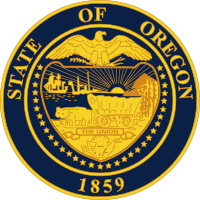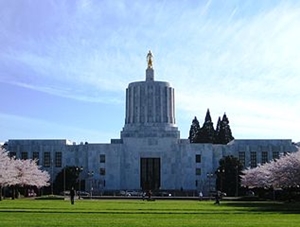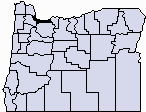In Oregon, a Multnomah County Circuit Court judge found county campaign finance reforms unconstitutional. Judge Eric Bloch ruled the voter-approved limitations on campaign contributions and independent expenditures were impermissible under the free speech guarantees within the Oregon Constitution, citing a […]
 In Oregon, a Multnomah County Circuit Court judge found county campaign finance reforms unconstitutional.
In Oregon, a Multnomah County Circuit Court judge found county campaign finance reforms unconstitutional.
Judge Eric Bloch ruled the voter-approved limitations on campaign contributions and independent expenditures were impermissible under the free speech guarantees within the Oregon Constitution, citing a related Oregon Supreme Court opinion.
He ruled they also cannot force disclosure of the largest contributors to political mailers and other forms of communication.
The Multnomah County voters adopted the reforms with an 89 percent “yes” vote in November 2016. An appeal of the judge’s decision is expected.
March 6, 2018 •
Oregon Legislature Adjourns
On March 3, the Oregon Legislature adjourned its biennial short session. Bills passed strengthen domestic violence laws, create a task force to study opioid addiction treatment barriers and implement a peer support program, require more transparency from prescription drug manufacturers, and eliminate a […]
 On March 3, the Oregon Legislature adjourned its biennial short session.
On March 3, the Oregon Legislature adjourned its biennial short session.
Bills passed strengthen domestic violence laws, create a task force to study opioid addiction treatment barriers and implement a peer support program, require more transparency from prescription drug manufacturers, and eliminate a federal deduction for businesses on state tax returns.
Gov. Brown has 30 days to sign, veto, or let the bills become law without her signature.
January 24, 2018 •
Oregon Voters Approve Tax Measure
In a special election on January 23, Oregon voters approved Measure 101. Measure 101 keeps taxes on health insurers, hospitals, and managed care organizations that were passed during the 2017 legislative session. The taxes will help fund the Oregon Health […]
 In a special election on January 23, Oregon voters approved Measure 101.
In a special election on January 23, Oregon voters approved Measure 101.
Measure 101 keeps taxes on health insurers, hospitals, and managed care organizations that were passed during the 2017 legislative session.
The taxes will help fund the Oregon Health Plan, the state’s Medicaid program.
Unofficial results show 61 percent of voters approved the measure, with 925 out of 1335 precincts reported.
November 7, 2017 •
Special Election Called in Oregon
A special election will be held on January 23, 2018, to consider a veto referendum on taxes included in a 2017 legislative session bill. The taxes at issue are on healthcare insurance premiums intended to provide funding for people on […]
 A special election will be held on January 23, 2018, to consider a veto referendum on taxes included in a 2017 legislative session bill.
A special election will be held on January 23, 2018, to consider a veto referendum on taxes included in a 2017 legislative session bill.
The taxes at issue are on healthcare insurance premiums intended to provide funding for people on the Oregon Health Plan, Oregon’s version of Medicaid.
September 20, 2017 •
Lobbyist Leaves Firm to Take Seat in Oregon Legislature
Gov. Kate Brown administered the oath of office to the now-former lobbyist for powerful public employee unions SEIU Local 503 and AFSCME Council 75, among other left-leaning groups. Andrea Salinas was appointed by the commissioners of Multnomah and Clackamas Counties […]
 Gov. Kate Brown administered the oath of office to the now-former lobbyist for powerful public employee unions SEIU Local 503 and AFSCME Council 75, among other left-leaning groups.
Gov. Kate Brown administered the oath of office to the now-former lobbyist for powerful public employee unions SEIU Local 503 and AFSCME Council 75, among other left-leaning groups.
Andrea Salinas was appointed by the commissioners of Multnomah and Clackamas Counties to fill the vacancy.
Rep. Salinas is unsure what she will do work for outside the Legislature since she had to resign her lobbying position.
September 18, 2017 •
Oregon Legislators Getting Head Start on 2018 Session
Lawmakers are meeting this week for three legislative days to start discussions on bills they would like to pass during the shorter, 32-day session next year. In addition to getting updates on this year’s wildfire season and how the state […]
 Lawmakers are meeting this week for three legislative days to start discussions on bills they would like to pass during the shorter, 32-day session next year.
Lawmakers are meeting this week for three legislative days to start discussions on bills they would like to pass during the shorter, 32-day session next year.
In addition to getting updates on this year’s wildfire season and how the state is reacting to Equifax’s consumer data breach, legislators will be discussing a proposal to institute a greenhouse gas “cap and invest” proposal, which would fine businesses that go over their limit on greenhouse gas emissions and would invest that revenue into green-energy infrastructure.
Legislators are also being tasked with approving executive appointments during this three-day period.
July 10, 2017 •
Oregon Legislature Adjourns; Lobbying Reform Bill Dies
The Oregon Legislature adjourned July 7, three days before its July 10 constitutional deadline. In the final days of the session, lawmakers passed a $5.3 billion package of taxes and fees to fund transportation upgrades and another bill to reduce […]
 The Oregon Legislature adjourned July 7, three days before its July 10 constitutional deadline.
The Oregon Legislature adjourned July 7, three days before its July 10 constitutional deadline.
In the final days of the session, lawmakers passed a $5.3 billion package of taxes and fees to fund transportation upgrades and another bill to reduce state spending by $200 million over the next two years.
However, lawmakers failed to pass lobbying reforms introduced at the request of Gov. Kate Brown. Following a flurry of last-minute activity in the House to pass Senate Bill 43, a bill to modify Oregon’s lobbyist registration and reporting requirements, the Senate opted to let the bill die.
July 6, 2017 •
Oregon House to Consider Lobbying Reform Bill
Senate Bill 43, a bill to modify Oregon’s lobbyist registration and reporting requirements, is set for its third reading in the House on July 6. The bill clarifies certain public officials and persons who provide professional services to entities meeting […]
 Senate Bill 43, a bill to modify Oregon’s lobbyist registration and reporting requirements, is set for its third reading in the House on July 6.
Senate Bill 43, a bill to modify Oregon’s lobbyist registration and reporting requirements, is set for its third reading in the House on July 6.
The bill clarifies certain public officials and persons who provide professional services to entities meeting specified criteria are not exempt from lobbyist registration and reporting requirements. Senate Bill 43 expands current lobbyist exemptions to additionally include elected public officials, certain representatives supervising an entity’s lobbying activities, and individuals who meet with legislative members in a personal capacity.
The measure expands the information a lobbyist must include on a registration statement. The registration must name each political committee the lobbyist advises or controls, each political committee for a candidate or elected official the lobbyist-controlled political committee made political campaign contributions to, and an acknowledgement the lobbyist has read and understands laws and administrative rules governing lobbyists.
Senate Bill 43 requires lobbyist reporting statements to include identification of each topic and each measure lobbied on and will require statements to be filed monthly during the legislative session. The bill also requires the Oregon Government Ethics Commission to conduct random audits of lobbyist reporting statements. The effective date for changes to lobbyist reporting statements is April 1, 2018.
The bill declares an emergency, meaning most provisions will become effective upon passage. Senate Bill 43 was introduced at the request of Gov. Kate Brown and she is expected to sign the legislation if passed by the July 10 constitutional adjournment date.
May 26, 2017 •
Campaign Finance Legislation Introduced in Oregon
On May 23, Rep. Mitch Greenlick introduced House Joint Resolution 32, proposing a ballot measure to impose a $500 limit on political contributions from any organization that gets more than half of its funding from public sources. HJR 32 seeks […]
 On May 23, Rep. Mitch Greenlick introduced House Joint Resolution 32, proposing a ballot measure to impose a $500 limit on political contributions from any organization that gets more than half of its funding from public sources.
On May 23, Rep. Mitch Greenlick introduced House Joint Resolution 32, proposing a ballot measure to impose a $500 limit on political contributions from any organization that gets more than half of its funding from public sources.
HJR 32 seeks to limit influence from Medicaid providers that profit from the Oregon Health Plan while making large political contributions to lawmakers.
Under current law, organizations may make unlimited contributions and expenditures to candidates and political committees.
February 14, 2017 •
Oregon Lawmakers to Consider Pay-to-Play Bills
Rep. Knute Buehler is set to introduce two bills to restrict pay-to-play politics. House Joint Resolution 17 seeks to amend the Oregon Constitution to ban corporations, nonprofits and labor unions from making contributions to candidates or political action committees. House […]
 Rep. Knute Buehler is set to introduce two bills to restrict pay-to-play politics.
Rep. Knute Buehler is set to introduce two bills to restrict pay-to-play politics.
House Joint Resolution 17 seeks to amend the Oregon Constitution to ban corporations, nonprofits and labor unions from making contributions to candidates or political action committees.
House Bill 2914 would require bidders on state contracts to disclose their five greatest campaign contributions in the state.
If passed, the measures would likely face legal challenges on the basis of free speech restrictions.
December 5, 2016 •
Portland City Council to Consider Campaign Finance Ordinance
On December 7, Portland City Council will consider the proposed Open and Accountable Elections package to create a public campaign finance matching system, increase penalties for willful violations of election laws, and improve contribution reporting requirements. The ordinance would put […]
 On December 7, Portland City Council will consider the proposed Open and Accountable Elections package to create a public campaign finance matching system, increase penalties for willful violations of election laws, and improve contribution reporting requirements.
On December 7, Portland City Council will consider the proposed Open and Accountable Elections package to create a public campaign finance matching system, increase penalties for willful violations of election laws, and improve contribution reporting requirements.
The ordinance would put the Office of Neighborhood Involvement in charge of enforcement. The proposal originally sought to place the task of enforcement on the Auditor’s Office, which administers elections; however, Auditor Mary Hull Caballero challenged the idea as a violation of the city’s charter.
November 9, 2016 •
Multnomah County, OR Campaign Finance Measure Passes
Campaign finance ballot measure 26-184 passed on November 8 with an 88 percent to 11 percent tally. The measure seeks to limit campaign expenditures and contributions and promote transparency by requiring heightened advertisement funding disclosures. Measure 26-148 prohibits candidates from […]
 Campaign finance ballot measure 26-184 passed on November 8 with an 88 percent to 11 percent tally. The measure seeks to limit campaign expenditures and contributions and promote transparency by requiring heightened advertisement funding disclosures.
Campaign finance ballot measure 26-184 passed on November 8 with an 88 percent to 11 percent tally. The measure seeks to limit campaign expenditures and contributions and promote transparency by requiring heightened advertisement funding disclosures.
Measure 26-148 prohibits candidates from receiving more than $500 from any individual or political committee per election cycle and puts an independent expenditure cap at $5,000 for individuals and $10,000 for political committees per county candidate race. This ballot measure comes as a response to the recent increase in big money spending in Multnomah County elections.
Oregon is one of only six states in the country with no campaign contribution limits. The measure is set to be implemented by county ordinance no later than September 1, 2017.
July 7, 2016 •
Multnomah County, Oregon to Vote on Campaign Finance Reform
The Multnomah County Charter Review Committee voted Wednesday to add a campaign reform ballot measure to the November ballot. Voters will decide whether the county should amend its charter to limit campaign contributions from individuals to $500 per person per […]
 The Multnomah County Charter Review Committee voted Wednesday to add a campaign reform ballot measure to the November ballot.
The Multnomah County Charter Review Committee voted Wednesday to add a campaign reform ballot measure to the November ballot.
Voters will decide whether the county should amend its charter to limit campaign contributions from individuals to $500 per person per cycle for county races. The measure would also require candidates to disclose their five largest contributors on political advertisements.
The Oregon Government Ethics Commission has asked Gov. Kate Brown to introduce legislation in 2017 to strengthen lobbying registration requirements. The commission wants to crack down on the registration exception that allows persons spending less than 24 hours or $100 […]
 The Oregon Government Ethics Commission has asked Gov. Kate Brown to introduce legislation in 2017 to strengthen lobbying registration requirements. The commission wants to crack down on the registration exception that allows persons spending less than 24 hours or $100 on lobbying per quarter to avoid registering as lobbyists.
The Oregon Government Ethics Commission has asked Gov. Kate Brown to introduce legislation in 2017 to strengthen lobbying registration requirements. The commission wants to crack down on the registration exception that allows persons spending less than 24 hours or $100 on lobbying per quarter to avoid registering as lobbyists.
Brown has until December 9, 2016 to review proposals from state agencies and file bills for the 2017 session.
State and Federal Communications, Inc. provides research and consulting services for government relations professionals on lobbying laws, procurement lobbying laws, political contribution laws in the United States and Canada. Learn more by visiting stateandfed.com.


